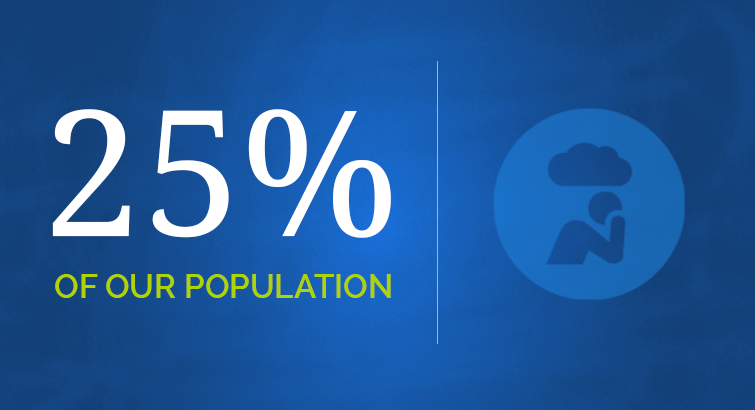|
In Guyana, we tend to think of persons with mental health issues as being “mad”, street dwellers, and patients at the National Psychiatric Hospital. Most might be surprised to learn that the symptoms of mental health illness can include the following: - Changes in eating and sleeping patterns (increase or decrease) - Loss of interest in previously enjoyed activities - Prolonged sadness, anger, nervousness, fear or irritability - Social withdrawal or Isolation - Loss of energy, motivation, productivity and efficiency - Issues with concentration, memory or rational thought - Increased use of alcohol or illegal substances - Hearing voices or seeing things that are not there - Physical symptoms such as headaches, chest pain, dizziness or sweating. - Suicidal thoughts Mental Health is therefore the state of our emotional and psychological well-being, which is the state of being comfortable, healthy and happy. Having good mental health is not just living without a diagnosis of mental illness but also making a good contribution to society. It means that we are able to go to school, obtain and maintain employment, have healthy relationships and more importantly, think, feel and act healthily with the capacity to change if needed. If someone has dysfunctional thoughts, moods or behavior, they may be suffering from a mental illness. The World Health Organization has determined that one in four people in the world will be affected by mental or neurological disorders at some point in their lives. Statistically, this means that over four hundred and fifty million persons around the world will be suffering from mental illness. Mental illnesses such as depression or anxiety are more common than non-communicable diseases such as cancer or diabetes. A study conducted by researchers (Dr. Jorge Balserio., Bhiro Harry et al.) from the Georgetown Public Hospital Corporation found that more than 200,000 Guyanese are suffering from some form of mental illness. This figure represents about 25% of our population, a staggering amount. This basically means that if you are not suffering from a mental illness, you probably know someone who is. Mental illness is so prominent yet we unconsciously silence those who are suffering. Many persons are afraid to talk to someone because it is believed that the mental illness defines them and makes them less a person. People are not afraid to say that they have cancer because cancer does not define who they are and how they are perceived. Why is mental illness different and more stigmatized? Attempting to have good mental health is attempting to improve your overall quality of life. Good mental health means greater self-esteem and self-confidence, motivation, productivity and efficiency. It allows us to sleep better, eat and exercise. It builds greater resilience. No one is immune to life’s stressors; we all, at one point or another feel unhealthy amounts of stress. Having good mental health is what allows us to healthily and effectively deal with stress and bounce back from adversity. Our mental health can negatively influence our physical health and result in multiple ailments such as heart, kidney and respiratory issues. Where does mental health illness come from? It emerges from a complex mix of genetic, biological, psychological and environmental factors. No one factor results in a mental illness. An individual is two to three times more likely to develop a mental illness, if it exists in their family. Distressing situations such as head trauma, substance abuse and personal traumas like domestic abuse also makes persons more likely to develop a mental illness. The National Institute for Mental Health (NIMH) has determined that 90% of suicides are caused by mental illnesses. Considering the prominence of mental illness, it is beneficial for everyone to know the signs and symptoms, such as outlined earlier, which may point to its onset. There are more than two hundred classified forms of mental illnesses. Some of the more common disorders are depression, anxiety disorders and schizophrenia. There are specific symptoms that come with certain disorders but there are universal signs that you may be suffering from a mental illness in general. These are typically characterized by sudden, yet prolonged changes in mood, thinking and behavior. If you have been continuously experiencing a number of these symptoms for more than two weeks, seeing a mental health professional is recommended. CONCLUSION What can you do to help heal those with mental illness? Firstly, educate yourself and others on mental illness. Encourage more open conversations on the subject, as this is the only way to break the stigma and allow mental health to be treated as a legitimate health condition. The more we talk, the more people feel they can speak. The more we share, the more others feel comfortable sharing. Secondly, if you believe you may have a mental illness, be assured you can be helped. Mental illness does not have to control your life. All types of mental illnesses can be effectively treated and managed with proper medication and counselling. Do not be afraid to reach out. Remember that mental illness is not a personal failure. How you feel is not who you are.
2 Comments
MOHAMED ZAIFF HUSSAIN
25/2/2018 22:47:11
I'M INTERESTED IN THIS PROGRAM
Reply
7/3/2018 11:05:45
We welcome your involvement Mohamed. Kindly visit our website to find ways of getting involved. You can either volunteer or donate, the choice is yours and every bit helps.
Reply
Your comment will be posted after it is approved.
Leave a Reply. |
About Us:Heal Guyana is a registered, not-for-profit organisation which functions as a civil society platform that focuses on empowering Guyanese and influencing citizens toward positive behavior change. Disclaimer:The views expressed herein are those of the Author; they do not necessarily reflect the views of Heal Guyana or its Executives. |




